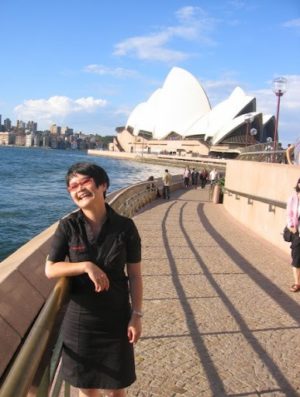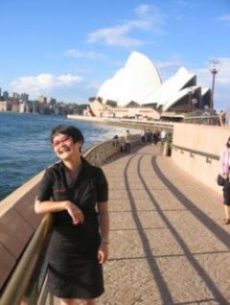
Featured Voices: Angeline Aow
We were fortunate enough to sit down with international educator and international school consultant, Angeline Aow. Angeline is an international educator, learning and development specialist, workshop leader, school evaluator and pedagogical leader. In these roles, she has worked in the Asia-Pacific, European, Middle-East and African regions. Angeline trained and taught as a primary school teacher in Sydney, Australia. She then began her international school career at Nanjing International School, China and is currently working part-time at Berlin International School, Germany, in the role of PYP Coordinator (Upper Elementary). She also serves as a part-time International Advisor (focused on Inclusion via Diversity, Equity and Anti-racism – I-DEA) with the Council of International Schools. Her experiences as a homeroom teacher, music specialist, accreditation coordinator, curriculum coordinator and professional learning and development coordinator has given her unique insights in multiple areas.
What inspired you to pursue a career in education?
I’m someone who always wanted to be a teacher, to be honest. I think some people have later paths that bring them into teaching, but I was always someone who knew.
When I was in high school, I did a teaching placement for work experience in a primary school. I had also been teaching kids how to play piano throughout high school, so I knew that I enjoyed the teaching process.
And then through these experiences, I knew I wanted to become a primary school teacher and was working towards doing that at university. But I didn’t want to do a straight teaching degree because I thought that could be pretty boring. And so I did a Bachelor of Arts so I could study a whole bunch of different things like semiotics, women’s studies, and philosophy.
And then I did a Masters of Teaching, which was offered at my university for a year and a half. This included an internship for a full term. I thought that was a great way to get the necessary qualifications to become a teacher.

What inspired the shift to international education and what did that transition look like?
So, I mentioned a teaching internship that I did throughout university. Through this, everyone had to do a placement. During the placement, you spend a whole ten weeks in a school.
Since this was unpaid, I looked for different opportunities and through my masters programme the university had five scholarships they were giving out for international teaching placements. Each year they had a “Mobility in Asia” program, and five students were sponsored to go overseas and teach.
The year I did it, the University of Sydney worked with the Ministry of Education inSingapore. And, so that’s where I did my one-term internship. I also had a few other teaching placements in Sydney, but they weren’t as long.
So I already had a taste of teaching overseas and after that I was going to go to London and work as many Australians do. I had a working holiday visa to go there and I was going to just casually teach and backpack and travel around. I wanted to do this because of course, knowing you always wanted to be a teacher, it’s like you never leave school, right? It was a great opportunity to get out and see the world before beginning my career in education.
Diving back into teaching, the state of New South Wales interviews everyone who graduates as a teacher and they had a targeted graduate initiative where they chose 300 people in the whole state to infuse new teacher blood into the system.
I was very lucky. I got one of these positions and I started teaching in Sydney for two and a bit years. When I did that, the school I was in was a great school in a middle class area.
But at the beginning of my career it was the wrong place for me because it was where people go out to pasture because it’s a really nice, cushy job. And so in summary, I had this year planned where I was going to just work in London and travel, and that got cut short because I got called back home for this special posting that I received. Having missed out on maximizing my working holiday visa, I started to look for teaching opportunities overseas and landed my first post after attending a job fair.
Do you have any advice that you would give to somebody at the very beginning of their international education journey?
My advice would be if you’re at the beginning, then you’re probably still building your own professional identity, right? So you may be still trying out different curricula. You might be trying out different types of schools or communities. You might not be too sure what kind of areas you are even going to specialize in and be good at.
For example, I taught from kindergarten all the way through to grade six before I landed in this space where I identified that I’m really a better middle to upper primary teacher than I am a lower primary teacher. But it takes a while to get to know that and you have to try new things.
So, I think if you are a teacher looking to go overseas, my advice would be to work out who you are at this point in time and then search for schools that are going to match your values. Research a school’s mission, vision, philosophy, which curriculum do they offer, etc.
What kind of school is it? Are they a for profit or a not for profit school? Are they a school that’s going to offer you opportunities in terms of leading extracurricular activities or are they a big school? Do they have a really big professional learning budget? Or are they a small school where you can have an accelerated path through taking on many different roles.
It depends what you like and what you’re after at whatever stage of development you are in. Because whether you go overseas or not, you might be at a different stage in your career. Ultimately, I think the most important thing is to be in it for the right reasons, which is to serve the kids.

Are there any places that for you have stuck out in either a good way or a bad way?
I have visited a lot of different schools and worked in different regions. But I’ve been at Berlin International School since 2005.
I met my husband here and we have a family now. We have two kids. I love working at my school. It’s somewhere where I feel like I’m valued for what I bring. And the city itself, Berlin, is a really great place to live.
How important do you think it is to amplify diverse voices in the international education field?
So, I am a Chinese Australian, born in Malaysia, living in Berlin, Germany.
And so I see the world through my lenses. And I’m a mother. I am a curriculum coordinator. I am an education consultant. So I’m going to see the educational world, too, from those lenses.
I will never know what it’s like to be a black woman in education. I will never fully be able to walk in someone’s shoes in that way. I will never know what it’s like to be an educator who uses a wheelchair and so I think that that’s why it’s important to amplify voices.
There’s a book called The Astonishing Power of Storytelling by Robert Garmston and they talk about the different purposes of storytelling and how stories can help you understand, help you aspire and also help envision the world you want as well.
Stories can show you a different reality and allow you to think of the possibilities. I think that’s why it’s really important to have different voices, so that we’re breaking down our narrow worldview. That narrow worldview is what forms stereotypes and biases. Hence, the more different stories you have, the more you’re thinking more broadly. That is what will have an impact on your decision making.

In your experience with the international education community, what strides have you seen to amplify the ideas of diversity, equity, inclusion, and justice? Are there any areas that demand further attention with regards to DEIJ?
I think it’s an area that demands constant attention. There are lots of different areas in schooling that demand our attention. And I think that this area fundamentally helps or hinders our ability to create a sense of belonging. The sense of belonging and feeling safe and secure in your environment is fundamental for learners to be in a state of mind where learning can thrive.
And so this should be a priority above all else. But in order to raise awareness of how all educators can do that, DEIJ needs to underpin everything that everyone does. At this point, I think that strides have been made in some areas depending on where you arem the school you’re in and what your school values.
For example, the IB curriculum and framework had a requirement that every school had to have a policy about learning diversity and inclusion. But for many, many years the definition of learner diversity mostly had to do with learner variability. It had to do with students with intellectual and or learning difficulties, but not necessarily an expanded description of diversity which includes race, sexual orientation, gender, class, ethnicity, age, etc..
So, of course, schools made progress in that one area because it was highlighted. It was something that was valued and a part of standards and practices schools had to meet.DEIJ has started to gain the same prominence through statements by organizations that accredit or authorize schools, however, this area demands further attention for progress to be accelerated.
From my experience, some schools might be focusing on a specific identity aspect. For example, a school might support a GSA group. Then they’re going to be making strides on inclusive gender and sexual orientation, but they may not have addressed the race piece at all. So I think the danger is having so many things that need our attention. We need to have an intersectional approach, and we also need to do things in depth. This is complex work.
So, I think whatever your entry point is as a school, please do it well. Don’t just skim the surface.

Okay, let’s dive into some rapid fire questions. What’s your favorite city that you’ve been to?
Berlin.
Favorite food that you’ve had in your travels?
I’m a big sucker for custard tarts.
Favorite Book?
The Wake Up by Michelle MiJung Kim
Next place that you’re excited to travel to?
Well, I’m actually heading to The Hague for the IB Global Conference.

